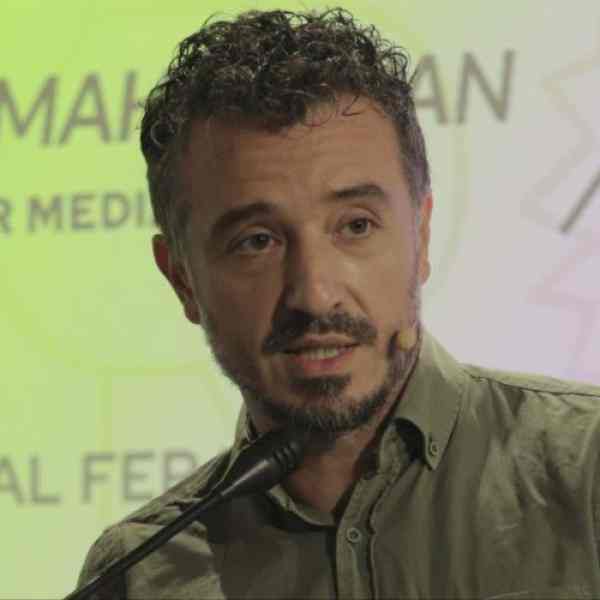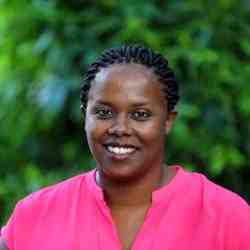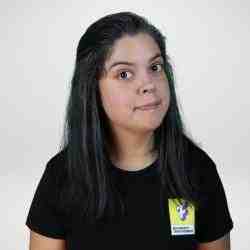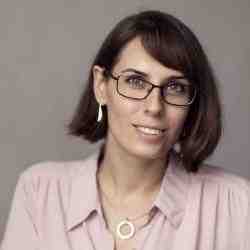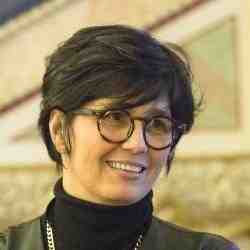Introducción
Lorenzo is working to guarantee that citizens at all life stages have the skills to critically evaluate media and information and, ultimately, create and share valuable information responsibly. Together, these capabilities shape media and information literacy (MIL), a crucial life skill more necessary than ever amidst the wave of information and disinformation.
La idea nueva
As a society, we have not yet been able to equip citizens with the right skills to navigate a world of constant change. Lorenzo is highlighting this need in the information arena, where our day-to-day is dominated by unmeasurable amounts of information with the added complexity of easily accessible artificial intelligence. Lack of media and information literacy hampers people's ability to understand the world around them, which can lead to poor decision-making on social and personal issues, such as those related to health or voting.
Lorenzo's vision is that all citizens have the right to Media and Information Literacy (MIL) as an essential life skill to deal with information flows effectively, both as receivers and producers of information. With his organization, Verificat, he is creating a mindset shift where the ability to access and recognise trustworthy information and sources is seen not just as a skill but as a right. He is creating a movement in informal and formal educational organizations, so they understand the relevance of media and information literacy and develop relevant and updated tools to tackle it.
A distinctive feature of Lorenzo's approach is the circularity between his fact-checking newsroom and educational programs. Lorenzo has a specialized team of fact-checkers that allow the Verificat model to be at the cutting edge of novelties in the ever-changing informational landscape. Another is that co-creation is at the core of everything Lorenzo does: he weaves connections between fact-checkers and teachers, educators, NGO collaborators, and senior associations to co-develop relevant pedagogical materials. By allowing fact-checkers to shift from their exclusive role as information evaluators to an interactive role as knowledge and skill transmitters to teachers, students, the elderly, and vulnerable communities, a virtuous cycle is created.
Lorenzo is aware that this problem affects all segments of the population, and he has started with two crucial groups. On one hand, digital natives are exposed to even higher amounts of information through diverse and non-traditional channels such as social media and on-line content. Here Verificat is building capacity with educators and advocating for the inclusion of Media and Information Literacy in the formal school curriculum. Lorenzo has established strategic partnerships with local administrations, European organisations and key NGOs to advocate for the inclusion of Media and Information Literacy within the formal education offered in Catalonia and gradually scale to other autonomous communities in Spain.
Having achieved buy-in from key allies, his next step has been to co-create a programme for older generations who face an increasing digital divide leading to higher risks of social exclusion, scams, and disinformation. The co-creation aspect is essential for relevance to each target group, and while Lorenzo may focus on TikTok trends or influencers for younger users, for the older audience, Verificat works with their channels (WhatsApp, Facebook), interests and motivations. Lorenzo's methodology is designed to be used by participants in an extremely practical way, for example with the elderly to be able to find reliable political information in voting season or for youth in TikTok where students create campaigns to fact–check misinformation in areas such as migration and climate change.
By building the correct alliances (specialized NGOs) his methodology can be easily adapted to new groups, and his peer-to-peer educational circles mean that spread is rapid. His next priority is migrants, one of the most vulnerable groups to misinformation and at times not accessible through formal education. Lorenzo states that by not targeting vulnerable groups we would as a society be creating new inequalities.
El problema
The exponential acceleration of information channels, fluxes, and formats in the digital age has resulted in a new world where the ability to navigate within a reality of “information disorder” has become necessary to make sense of reality. Never has it been so difficult to know what is true and what is fake. Within this context, the generation and spread of disinformation have become a generalized phenomenon that affects the role of social networks, instant messaging apps, and the Internet in general as sources of reliable information for the general population. The multiple problems associated with this phenomenon include distrust in traditional sources of information, increasing social polarization and stigmatization of vulnerable groups.
Lorenzo witnessed this issue first-hand during Catalonia's illegal referendum for the independence from Spain in 2017, considered among the most sensitive political issues in recent decades. The two opposing groups were severely polarized with disinformation campaigns in social media and the internet, hampering social cohesion and even resulting in violent demonstrations led by the re-diffusion of manipulated news and images.
To solve this huge problem there have been top-down attempts through regulations and technological tools such as fact-checking mechanisms, but due to the lack of transparency and regulation in the information and technology industry and the decreased credibility of the media, these solutions are insufficient to solve this issue from its root causes. As Lorenzo says, there must be a shift in how all sectors of society perceive and act in this complex informational era.
The education system in Spain, as in most European countries, has not kept up with the fast-evolving digital landscape. There have been institutional efforts to digitize and build capacity, but they are seldom focused on media and information literacy (MIL). In addition, school directors and teachers often express their unpreparedness when it comes to educating on issues such as social media consumption, tackling disinformation, or conducting online research. As a result, in Spain, the PISA report reveals insufficient capacity among teenagers to recognize the origin of information or the trustworthiness of a source.
Within wider society, the digital gap continues to mainly affect vulnerable communities and the lack of media and information literacy among the population in general hinders the ability to freely create, consume and disseminate information.
A rapidly changing technological and informational environment, along with fast-developing media formats, deepens the digital divide and increases the risk of social exclusion, for example making seniors more vulnerable to scams, a lack of independence, and misinformation and disinformation. Over one-fifth (20.8%) of the EU population is now 65 and over, despite having a significant role to play in European society, seniors are often treated as lacking self-agency.
UNESCO, highlighted that the evolving technological paradigm of communications coupled with an era of economic uncertainty and mass migration had given rise to an increase in hate speech directed towards marginalized communities, often based on misinformation, which leads to further polarization and radicalization which in turn undermines social cohesion and democratic stability.
La estrategia
Lorenzo focuses on bridging the gap between society knowing that information should be checked and people wanting to invest time to do so. This aim can only be achieved gradually, and for that, he targets strategic cohorts of society that can activate a movement of proactive consumers and producers of information that advocate for fact-based information. Building strategic and diverse alliances, co-creation, and peer-to-peer learning are at the core of Lorenzo’s work.
Lorenzo has created an innovative methodology based on four overarching elements:
1) Circular model: A distinctive feature of Lorenzo's approach is the circularity between the fact-checking newsrooms and the educational programs.
2) Co–creation at the core: Lorenzo weaves connections between fact-checkers and teachers, educators, NGO collaborators, and senior associations to co-develop pedagogical materials, to which fact-checkers provide feedback on stereotypes and misconceptions identified among trainees or stakeholders.
3) Appealing and hands-on educational approach: The co–creation aspect throughout the methodology's design process allows him to know the target group and their interests and motivations very well. That's why Lorenzo's method is designed to be used by participants in a very practical way and apply it to their interests.
4) Diversity and adaptability: Lorenzo is aware that this problem affects citizens at every life stage in different ways. Hence, he has started with young people and the elderly, with highly adaptive methodologies to iterate them and gradually reach out to the entire society.
To get the buy-in from crucial stakeholders, he has developed a three-fold strategy: 1) building capacity within the education system, 2) institutionalizing Media and Information Literacy as an essential skill for the youth, and 3) media literacy to activate the self-agency of vulnerable groups.
1. Building capacity within the education system
His capacity-building program for teachers, “Desfake,” allows them to implement media and information literacy in day-to-day school activities. Teachers are first exposed to diverse Media and Information Literacy (MIL) tools to co-create and ground their strategy and implement in their class. Hence, teachers learn to recognize their biases and emotional responses to information, investigate the origin of different types of information, evaluate the trustworthiness of sources, and apply critical thinking to different contents and exercises, using digital means to cross-verify information with reputable sources.
The methodology is designed to be applied in everyday life by internalizing quick habits and tools to assess information in the digital environment quickly. Desfake includes a distinctive experiential learning final project, where students and teachers co-create fact-checking videos in TikTok to be disseminated and use TikTok as a multiplier of MIL. Lorenzo's peer-to-peer approach means these teachers become mentors to a small group of Desfakers, teachers who are willing to advocate for MIL, within their educational center, spreading the methodology.
Today, Lorenzo has started co-developing and putting in practice both face-to-face and “train the trainers” formats in 30 high schools between Catalonia, Valencia, and the Balearic Islands and works with key partnerships at the Ministry of Science & Technology and the city council of Barcelona. Both entities align with Verificat's vision and will support the planned expansion to reach 100 schools by 2024 in different regions.
Lorenzo launched a digital open-source platform with The Mobile World Capital Foundations and the City Council of L’Hospitalet de Llobregat to scale his impact and reach as many teachers as possible. This methodology allows schools to start their MIL journey independently. Lorenzo believes that this capacity-building model will mean there will be enough teachers once MIL finally becomes part of the formal curriculum. In parallel, Lorenzo is partnering with Junior Report, a company active in journalism training for teenagers in 100 schools all over Spain, to introduce Desfake into their working plan. In this way, students learn MIL while working on their school newspaper.
Lorenzo is bringing fact-checking and MIL to journalism students to ensure capacity building for future generations. He has produced a playbook on disinformation for students in seven universities. This has acted as a spearheading strategy, and now, three other universities have hired Verificat to mentor co-creation sessions for the permanent implementation of the program.
2. Institutionalizing Media and Information Literacy as a fundamental right for young people
To achieve the institutionalization of Media and Information Literacy (MIL) in the formal education system, Lorenzo is working to include it in the ministerial educational curriculum. He partners with educational institutions and organizations working with youth. Together with the Fundació Bofill Digital Equity program (one of the most prominent educational organizations specialized in advocacy), Lorenzo is leading the creation of a movement of educators in collaboration with policy-making stakeholders such as the Platform for Media Education in Catalonia and the European network of fact-checking organizations IBERIFIER, that collectively endorse media literacy as a right and demand for its institutional introduction in Spain.
Lorenzo backs up the efforts to institutionalize MIL with the results of an impact measurement study conducted in 2022 by Verificat with the support of academic partners. Overall, the study evaluated capacity-building initiatives' impact on schools, showing remarkable results: the ratio of young people looking for other sources to back up the information received rose from 30% to 80%. In terms of evaluating the trustworthiness of a website, those who had passed through the Verificat programme were three times less likely to trust “non-worthy” sites than those who had not, and 83% could find evidence that supported their lack of trust.
3. Media Literacy to activate the self-agency of vulnerable groups
Due to the success of Verificat and with the wave of health disinformation during the pandemic especially affecting the elderly, Lorenzo launched the pilot project Verificat Salut. By partnering with 15 different libraries in Barcelona, 100+ seniors who recurrently went to the library learned to actively identify misinformation and how to protect themselves and others from Covid disinformation. This pilot inspired Lorenzo to create SUM, a peer-to-peer media and information literacy program for older adults (65+).
By creating strategic partnerships with elderly associations, retired university professors, and working seniors groups such as Association Grode/XEC3 or Amics de la Gent Gran, Lorenzo activates a network of volunteers who co-create media literacy training materials for their peers. This methodology has empathy at its core as it allows volunteers to contribute with their experience, knowledge, and understanding of the concerns of the elderly to develop applicable material that, through the volunteer network, reaches wider audiences. In the long term, Verificat aims to establish an international network of volunteer-based organizations exchanging best practices and knowledge.
Ultimately, Lorenzo has combined this process with developing a guide and playbook for local administrations and NGOs willing to launch this program independently, offering consultancy services to help others replicate the project methodology of action, and elaborating joint fundraising strategies at the local and international levels. To date this initiative has been piloted in Spain, Italy, and Finland. The University of Lapland in Finland is designing the impact evaluation of the action to measure the MIL skills of both trainers and final receivers of the workshops. Moreover, as a pilot, SUM impact will be measured in the replicability of the project and in creating a network of partners working with the same methodology all over Europe, which will be launched and measured at the end of 2024 and during 2025.
Currently, Lorenzo is co-creating MIL training with NGOs already working with marginalized communities, mainly immigrants, to increase awareness and capacity in the target group. The project aims to provide tools to access reliable information about society's political and social landscape. Through fieldwork and direct consultations with migrant communities, Verificat plans to understand better how misinformation affects them, including what channels of information they use, the stereotypes they suffer from, and how they intersect with other issues such as gender, education, and access to public services. The project aims to develop a specific set of media and information literacy material to improve social cohesion.
La persona
Lorenzo was born in Bologna, Italy, an only child of liberal parents. He grew up in the Berlusconi era and was fascinated and worried about how information control could be used to shape public opinion, and in turn shape democracy. When the Internet appeared, he truly believed that a new, positive information era had arrived, with citizen information and participation.
At the age of 16, at high school he held demonstrations against Berlusconi´s proposal to privatize part of the education system. Lorenzo played a key role in his high school, mobilizing students in his city and activating students all over the country and, contrary to many, managed to work with the teachers, getting their buy-in for his activity. At school, he was also the student representative, and he established a collaborative journal driven by his personal interest in communications and free speech. In his final year, Lorenzo wrote his end of school paper on how Mussolini used technology, imagery, and rhetoric to contribute to the creation of modern propaganda.
He later studied at the Department of Communications Sciences at the University of Bologna, followed by postgraduate degrees in Digital Journalism (UOC), Social Communications (Universitat Pompeu Fabra), and Democracy and Democratization (University College of London). Some of his academic work at this time include an analysis of Berlusconi's communications and speeches, a report on why mass media should be treated as a quasi-institution in democracies, and a dissertation in which he suggested, back in 2007 before it was opened to the broader public, that Facebook would become a powerful force in setting the public agenda.
Little did he know that this development, which he initially welcomed as a great democratization of information flows, would eventually become one of the root causes of the problems we are currently dealing with.
At the age of 25, Lorenzo began working in the communications department of the European Council on Foreign Relations (ECFR), a foreign policy think-tank. That period taught him a great deal about pluralism, different worldviews, and the importance of advocacy, learnings that he continues to apply in his daily work. Throughout his 20s, Lorenzo realized that he was drawn to the intersection of message, technology, politics, and the shaping of public opinion. He also realized that he had a great gift for bringing key people together and facilitating them working together.
While working at the ECFR, a close and admired friend of Lorenzo, who had her first daughter, told him that she would not vaccinate the baby. When he asked why, she provided him with a collection of blog posts and forums that argued against vaccination. This was a pivotal moment for Lorenzo. He had often gone down informational rabbit holes himself, and had learned to recognize and try to avoid as many cognitive biases as possible. The new risks for mass manipulation, at least in democracies, did not lie as much in top-down media monopoly, as much as in the uncontrolled flows of unchecked information online.
After his first daughter was born (and duly vaccinated), he felt the need to be part of the change, broke down the apathy that a good salary and an easy job can produce, opened a technological start-up dedicated to fact-checking in 2018, and co-founded Verificat one-year later as a side-project.
After a year, Lorenzo saw clearly that the educational, non-profit approach of Verificat was bound to produce a deeper social impact and decided to focus solely on this project.
